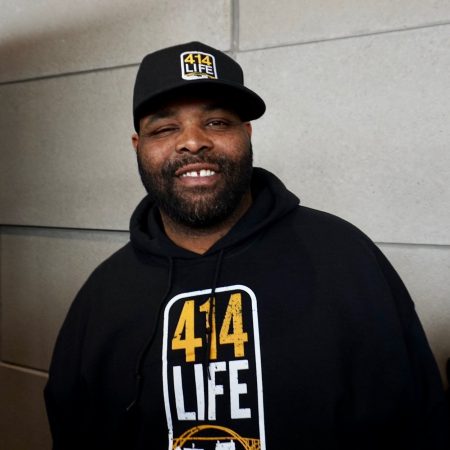New Program Uses “Violence Interrupters”
414 Life Program trains “interrupters" to combat city’s gun violence.

Chris Conley, 414 Life outreach and resource coordinator, Uniting Garden Homes, standing with the “interrupters” team, speaks to the press at the Froedtert Cancer Center. Photo by Andrea Waxman/NNS.
Keyon Jackson-Malone got involved in violent activities when he was a young man even though, earlier, he had helped resolve disputes as a peer mediator at Morse Middle School.
Seven years ago, he “had an epiphany” and resolved to turn his life around. Since then, Jackson-Malone, now in his early 40s, has been working as a “violence interrupter,” first at a grassroots level and now in the Office of Violence Prevention’s 414 Life program. His past is an important part of what makes him effective in that role, he said.
Reggie Moore, the city health department’s Office of Violence Prevention director; Jeanette Kowalik, Milwaukee health commissioner; and other city and program leaders announced last week new partnerships with Froedtert & the Medical College of Wisconsin and Ascension Wisconsin to combat gun violence. They also introduced the first team of interrupters at a news conference at the Froedtert Cancer Center.
Ten interrupters trained by Cure Violence, a successful violence prevention effort based in Chicago and implemented in multiple cities around the world, started working in the Old North Milwaukee and Garden Homes neighborhoods on the city’s North Side in November.

Keyon Jackson-Malone, community activist and 414 Life interrupter, talks with attendees at the Office of Violence Prevention news conference. Photo by Andrea Waxman/NNS.
On call 24/7, they have interrupted 26 potentially violent situations and have built a caseload of 35 individuals who receive mentoring, said Derrick Rogers, the site director leading the team.
Cure Violence, founded as “Ceasefire” in 2000, takes a public health approach to “curing” violent behavior. Milwaukee’s Blueprint for Peace, released in November 2017, also is rooted in the proposition that violence operates like a contagious disease.
“If people are not safe from physical, psychological and emotional trauma everything else in irrelevant,” Kowalik said.
The Cure Violence model employs community members such as Jackson-Malone, who have relationships with neighborhood residents and can relate to people struggling with violence.
Through the new partnerships, violence interrupters will be trained to provide support to families, friends and survivors of gun violence in hospitals and the surrounding communities.
The cost for 414 Life is estimated at $500,000 annually at its current scale and is funded on a year-to-year basis, Moore said. The city has budgeted $280,000 and an additional $200,000 has been raised from foundations this year, he said.
Moore aims to expand the program to the Hampton Heights neighborhood on the North Side and to neighborhoods on the East and Near South Sides by 2021.
This work is about individuals helping those at the highest risk for violence change their behaviors and the community’s norms, said Jackson-Malone, adding, “I was once a destroyer. Now I’m a rebuilder.”
This story was originally published by Milwaukee Neighborhood News Service, where you can find other stories reporting on eighteen city neighborhoods in Milwaukee.





















